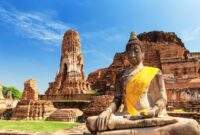Vacations for singles over 60 offer a unique opportunity for adventure, relaxation, and personal growth. This guide explores diverse vacation options tailored to the specific needs and preferences of this active demographic, addressing everything from budget considerations and health precautions to choosing the perfect destination and travel companions. Whether you envision a relaxing beach getaway or a culturally enriching city exploration, we’ll help you plan an unforgettable solo adventure.
We’ll delve into various vacation types, highlighting their unique appeal for older single travelers. We’ll also cover essential planning aspects, including budget management, travel insurance, and health considerations. Furthermore, we’ll discuss the pros and cons of group tours and provide resources for finding travel companions. The aim is to empower you to plan a safe, enriching, and enjoyable vacation that perfectly suits your individual needs and desires.
Destination Considerations
Choosing the right destination is paramount for single travelers over 60 planning a fulfilling vacation. Factors beyond simple sightseeing appeal significantly impact the overall experience, particularly for those prioritizing comfort, safety, and ease of travel. Careful consideration of several key criteria ensures a smoother, more enjoyable trip.
Prioritized Destination Criteria for Single Travelers Over 60
Five key criteria frequently top the list for single travelers in this age group. These factors influence both the pre-trip planning and the on-the-ground experience, contributing to a stress-free and enjoyable holiday.
- Accessibility: Destinations should offer easy navigation, with readily available transportation options catering to varying mobility levels. This includes accessible airports, hotels, and attractions. For example, a city with well-maintained sidewalks, ramps, and public transportation systems is preferable to one with limited accessibility.
- Safety: Personal safety is a primary concern. Destinations with low crime rates and a reputation for being welcoming to tourists are highly desirable. A good understanding of local customs and safety precautions is also crucial. For instance, researching areas known for petty theft and taking appropriate preventative measures is essential.
- Climate: A comfortable climate minimizes discomfort and potential health risks. Consider factors such as temperature, humidity, and the potential for extreme weather events. For example, avoiding destinations with extreme heat or cold during peak seasons can greatly improve comfort levels.
- Healthcare Access: Proximity to quality medical facilities is a significant factor, especially for those with pre-existing health conditions. Destinations with good healthcare infrastructure and readily available medical professionals offer peace of mind. For instance, researching hospitals and clinics near potential accommodations and understanding local emergency services is highly recommended.
- Social Opportunities: While some may prefer solitude, many single travelers appreciate opportunities for social interaction. Destinations with organized tours, group activities, or welcoming local communities can enhance the travel experience. For example, choosing a resort with planned social events or joining a guided walking tour can foster connections with fellow travelers.
Comparison of Bustling City versus Tranquil Beach Resort
A bustling city like San Sebastian, Spain, offers vibrant culture, historical sites, and diverse culinary experiences, but navigating crowded streets and fast-paced environments can be challenging for some older travelers. In contrast, a tranquil beach resort in the Caribbean, such as those found in Barbados, provides relaxation, beautiful scenery, and slower-paced activities, potentially minimizing stress and physical exertion. While the city provides cultural stimulation, the beach resort prioritizes rest and rejuvenation. The ideal choice depends heavily on individual preferences and physical capabilities.
Potential Challenges and Mitigating Strategies
Single travelers over 60 may encounter various challenges depending on their destination. Language barriers can be overcome by learning basic phrases or using translation apps. Loneliness can be mitigated by joining group tours or engaging with local communities. Concerns about scams can be reduced through thorough research and awareness of common tourist traps. Pre-booking accommodations and transportation minimizes unexpected delays and stress. Packing appropriately for the climate and carrying necessary medications also helps prevent unforeseen problems.
Health and Safety
Traveling independently, especially for single individuals over 60, requires careful consideration of health and safety. This section outlines essential precautions and preparations to ensure a worry-free and enjoyable vacation. Prior planning and proactive measures significantly reduce potential risks and allow for a more relaxing travel experience.
Preparing for potential health emergencies while traveling independently is crucial for single travelers over 60. This involves a multi-faceted approach encompassing preventative measures, readily accessible medical information, and emergency contact protocols.
Essential Health and Safety Precautions
A comprehensive checklist of essential health and safety precautions is vital for peace of mind. This checklist should be reviewed and adapted to the specific destination and activities planned.
- Consult your physician: Schedule a pre-travel checkup to discuss any existing health conditions, necessary vaccinations, and recommended medications. Obtain a detailed medical summary including allergies and current prescriptions, translated into the language of your destination if needed.
- Pack a comprehensive first-aid kit: Include essential medications, bandages, antiseptic wipes, pain relievers, anti-diarrheal medication, motion sickness remedies, and any personal medical supplies.
- Carry necessary identification and emergency contact information: Keep copies of your passport, visa, travel insurance policy, and emergency contact details separate from the originals. Consider wearing a medical alert bracelet or necklace if you have any significant health conditions.
- Inform someone of your itinerary: Share your detailed travel plans, including flight information, accommodation details, and daily activities, with a trusted friend or family member. Regularly check in with them during your trip.
- Stay aware of your surroundings: Be mindful of your surroundings and avoid walking alone in poorly lit or isolated areas, especially at night. Use reputable transportation services and avoid accepting rides from strangers.
- Learn basic phrases in the local language: Knowing basic phrases such as “help,” “hospital,” and “police” can be invaluable in emergency situations.
Preparing for Potential Health Emergencies
Proactive planning significantly mitigates the impact of unforeseen health issues. This includes having readily available medical information and established emergency contact procedures.
- Familiarize yourself with local healthcare services: Research the location of nearby hospitals, clinics, and pharmacies. Note down emergency numbers for your destination.
- Consider purchasing a medical evacuation insurance policy: This covers the cost of transporting you to a suitable medical facility in case of a serious illness or injury.
- Carry a list of your medications and allergies: This list should be in both your native language and the language of your destination. Keep a copy in your luggage and another on your person.
- Learn basic first aid: A basic first-aid course can equip you with the skills to handle minor injuries and illnesses while traveling.
Selecting Appropriate Travel Insurance
Travel insurance specifically designed for seniors traveling independently is essential. Policies should cater to the unique needs and potential health risks of this demographic.
- Look for comprehensive coverage: Ensure your policy covers medical emergencies, hospital stays, medical evacuation, and repatriation.
- Check for pre-existing condition coverage: Many policies offer coverage for pre-existing conditions, but this may require additional paperwork and a higher premium. Read the fine print carefully.
- Consider adding trip cancellation and interruption coverage: This protects you against unexpected events that may force you to cancel or cut short your trip.
- Compare policies from different providers: Shop around and compare policies from various reputable travel insurance companies to find the best coverage at a reasonable price.
Accommodation Options
Choosing the right accommodation is crucial for a relaxing and enjoyable solo trip. The ideal choice will depend on your budget, desired level of independence, and preferred amenities. Consider factors such as accessibility features for ease of movement, the availability of social opportunities, and proximity to local attractions.
Several accommodation types cater well to the needs of single travelers over 60. Each offers a unique blend of advantages and disadvantages.
Types of Accommodation for Single Travelers Over 60
Here are five accommodation options suitable for solo travelers in this age group, along with their respective pros and cons:
- Hotels: Hotels offer a wide range of options, from budget-friendly chains to luxurious boutique hotels. Advantages include convenience, readily available amenities (restaurants, pools, etc.), and often excellent accessibility features. Disadvantages can include higher costs compared to other options, potential lack of personal space or kitchen facilities, and a less intimate atmosphere.
- Resorts: Resorts provide all-inclusive packages that often include meals, activities, and entertainment. This can be particularly appealing for solo travelers seeking a hassle-free experience. Advantages include ease of planning and a wide array of amenities. Disadvantages are the higher price point and the potential for feeling overwhelmed by the sheer number of activities or a lack of privacy.
- Vacation Rentals (Apartments/Condos): Vacation rentals offer more space and independence than hotels. They often include kitchen facilities, allowing for self-catering, and can be more cost-effective for longer stays. Advantages include greater privacy and flexibility. Disadvantages can be a lack of on-site amenities, potential maintenance issues, and the need to manage cleaning and supplies.
- Boutique Hotels: These smaller, independent hotels often provide a more personalized and intimate experience. They frequently boast unique character and charm, with attentive staff and a focus on customer service. Advantages include a more personal experience and often a more central location. Disadvantages may be limited amenities and potentially higher prices per night.
- Senior-Specific Living Communities (with short-term stays): Some retirement communities or assisted living facilities offer short-term stays, particularly for those needing extra assistance or seeking a supportive environment. Advantages include readily available support services and social opportunities. Disadvantages are the potential higher costs and the need to meet specific eligibility criteria.
Accommodation Comparison Table
The following table compares three accommodation options: a standard hotel, a vacation rental, and a resort, focusing on features, pricing, and location.
| Feature | Standard Hotel (e.g., Holiday Inn Express) | Vacation Rental (e.g., Airbnb) | Resort (e.g., All-inclusive Beach Resort) |
|---|---|---|---|
| Price (per night, estimate) | $100-$200 | $80-$300 | $250-$500+ |
| Amenities | Basic amenities, pool, breakfast (sometimes) | Kitchen, laundry (sometimes), varies greatly | Multiple restaurants, pools, activities, entertainment |
| Accessibility | Generally good accessibility in newer hotels | Accessibility varies greatly depending on the property | Generally good accessibility, but check individual resort |
| Proximity to Attractions | Varies greatly depending on location | Varies greatly depending on location | Often located in resort areas, may require transportation to other attractions |
Summary
Planning a fulfilling vacation as a single traveler over 60 requires careful consideration, but the rewards are immeasurable. By thoughtfully evaluating destination options, budget constraints, and personal preferences, you can create a truly memorable experience. Remember to prioritize your safety and well-being, and embrace the freedom and independence that solo travel offers. With the right preparation and resources, your next adventure is waiting!




